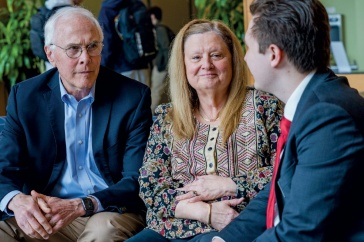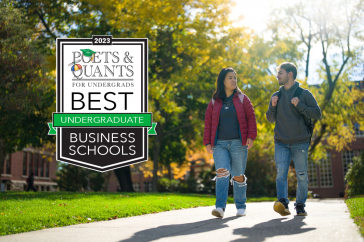
When Sam Warach '17 was a sophomore, he cofounded the UNH Entrepreneurship Club. In 2016, he was among four students to be the first to train as University Innovation Fellows. Last fall, Warach was part of a team that won a university-sponsored hackathon and went on to compete at the IBM Watson Conference in Las Vegas.
Then, earlier this month, Warach and physics major Max Miller '20 took first place in the Paul J. Holloway Prize Competition for the development of their social messaging platform, Droppit. The win came?with a $10,000 cash prize.
“I've always been passionate about innovation and entrepreneurship.” Wararch says.?Talk about an understatement: His latest project has him taking on the opioid crisis.
“Winning the Holloway Competition was huge,” Warach says. “It’s going to make it possible to move forward with NextStep sooner than we’d thought."
It was around the same time he helped launch the Entrepreneurship Club that the finance and international affairs major got the idea for an app that would allow people to access information on substance abuse services. Then, in the fall of 2016, he met Miller and Tristan Evarts '20, a chemical engineering?major, and invited them to work with him on the concept. Together they developed NextStep, a software platform for smart phones and the web that will connect people with treatment and recovery resources.?
NextStep won the Holloway Competition’s $2,500 Marsh Award for the best-written business proposal.
“Winning the Holloway Competition was huge,” Warach says. “It’s going to make it possible to move forward with NextStep sooner than we’d thought. We are aggressively seeking funding to bring on additional software engineers.”
Your Philanthropy Creates Possibilities
Explore the many ways you can support UNH at unh.edu/give/how-to-give.
Our development staff would be happy to work with you.

Plans call for NextStep to be released by January 2018. The last stage of testing will take place this summer to assure the app is as good of an idea as its developers think. “We’re not going to do it if it’s not going to be helpful,” Warach says, adding he doesn’t expect that to be the case. “Everyone knows how bad the issue of substance abuse is. Something has to be done.”
According to the Centers for Disease Control and Prevention, during the last five years there has been a 33 percent increase in illegal or prescription drug overdoses, with more than 52,000 deaths in 2016. New Hampshire has experienced the greatest increase, with nearly 500 deaths last year.
“The goal is to have NextStep connect people to existing infrastructure as well as provide digital treatment options,” Warach says. He references a phrase coined during a meeting where someone said that what the opioid crisis needs is a “Hotels.com for recovery services.”
“That’s one thing we want NextStep to be,” Warach says. “There isn’t anything that does it all. We’re looking to have all the information in one place — information on rehabilitation facilities, recovery coaches, sober houses, sponsors, etc. It’s a way to bring all that into the 21st century.”?
-
Written By:
Jody Record ’95 | Communications and Public Affairs | jody.record@unh.edu



















































